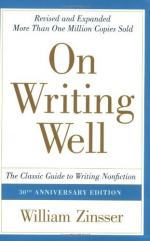|
This section contains 414 words (approx. 2 pages at 400 words per page) |

|
On Writing Well Summary & Study Guide Description
On Writing Well Summary & Study Guide includes comprehensive information and analysis to help you understand the book. This study guide contains the following sections:
This detailed literature summary also contains Topics for Discussion and a Free Quiz on On Writing Well by William Zinsser.
Zinsser's book on writing well provides both a comprehensive guide to writing nonfiction and a useful writer's reference. He starts with an overview of the writing craft and moves into specific nonfiction writing forms. The book wraps up with the important attitudes that good writers develop.
The author uses all of the principles in his own writing, including bits of humor that work to keep the reader's attention. Good writing captures and holds the reader's attention from beginning to end. Zinsser's style uses rhythm and other musical ideas to please the imagination. He incorporates unusual observations and approaches to his subjects, a technique that produces fresh prose. His style is nearly flawless, and he informs the reader on how he does what he does so well.
Books on writing usually use the work of other authors as examples. Zinsser does this, and includes some of his own work because he knows exactly what he was thinking while writing. This practical approach to getting inside the writer's mind carries more power than speculation on what other authors might have been thinking. Zinsser steps through an entire article that he wrote about his trip to Katmandu, points out the composition problems he dealt with, and explains the solutions he chose. The author accurately describes the writing process as a series of problems, all of which have solutions.
On Writing Well carries an important message: everyone can learn to write well. This breaks down a myth that engineers cannot write and writers cannot engineer. Both require training, practice, and a little bit of ability. A writer may never become a famous engineer, and an engineer may never become a great writer, but most people do not need fame or greatness. Doing the job well enough is sufficient. On Writing Well guides the reader into becoming a competent writer, one who can communicate genuine personality and useful information.
Zinsser does not condescend, nor does he dwell on the confusions to be found in the English language. He tells the writer's story in an honest manner, stating that writing involves mostly hard work and some inspiration. If a problem develops in a sentence that does not have a good solution, he suggests that the sentence be dropped altogether. His emphasis on the research material is good advice, as the research often leads to inspiration. The richness in good nonfiction comes from doing more research than needed and distilling the information down to the most interesting.
Read more from the Study Guide
|
This section contains 414 words (approx. 2 pages at 400 words per page) |

|



